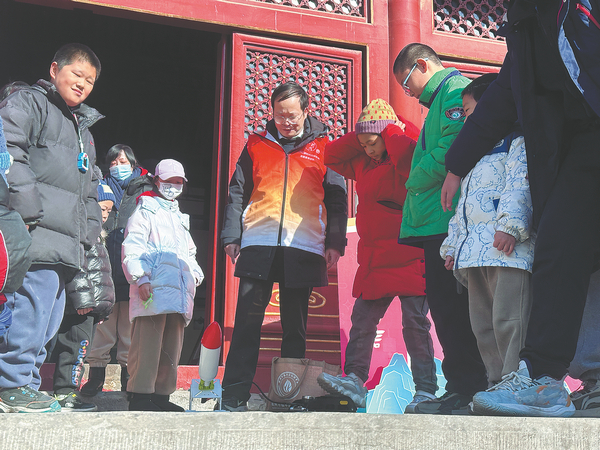

Trying trials
It has also shed light on touching legacies from Du's past and the consequential motivations that few of his friends or partners knew about.
Du came to the capital from a small village in Yantai in East China's Shandong province.
As a child, his family faced adversity since his mother lived with cerebellar atrophy, leaving her unable to care for herself. This unfortunate turn of events plunged his family into hardship.
Undeterred by the challenges, Du embarked on a journey to reshape his destiny through education. His academic efforts bore fruit in 2004, when he enrolled in the School of Arts at the Renmin University of China, where he specialized in digital media.
The financial constraints at home spurred him to juggle part-time work and student loans to finish his degree. In 2008, he managed to venture further into the realm of creative expression as a graduate student at Beijing Jiaotong University.
As a graduate, Du responded to the city's call for college students to launch entrepreneurship programs.
"We started a company to help universities and cultural enterprises to make and edit videos," Du says.
This also enabled him to make extra money to support his family and himself.
However, just as life was starting to improve in 2010, his father had a stroke. This, once again, disrupted the strides Du was making in life.
He had to postpone graduation and went home to take care of his dad for three months. After his father left emergency care, Du decided to take him to Beijing for rehabilitation, and he hired a caretaker to tend to his mother at home.
"That was the hardest time of my life," Du says, adding that he carried all the pressure of caring for his parents and finishing school on his shoulders.
His video business shut down in his absence, and he spent all his savings on medical expenses.
Media picked up on his story in 2012, recounting how he had to bring his father all the way back to Beijing for treatment.
Soon after, Du received about 2,000 calls from good Samaritans.
However, he only accepted one offer which helped him get an appointment with a well-known doctor and a hospital bed for his father. He says he tactfully rejected all the financial aid.
"I felt as I have two hands, I should be capable of dealing with all the challenges coming my way," he says.
The heartwarming messages carried Du through this rough patch, and helped him decide to pursue public welfare.
"Back in school, I always enjoyed helping others because I came from a rural area, where people are accustomed to helping one another," Du says.
He believed that people would only accept him — a man from the countryside, overwhelmed by big city life — if he was genuinely helpful and sincere.
"Beijing was so big to me. I felt like I could make a mistake with every word I uttered," Du says, recalling his early times in the capital.
He would prepare the large drawing papers and boards his classmates used for their courses and make his college roommates' beds.
After graduation, Du threw himself into designing and carrying out public welfare projects to allow institutions of higher learning and companies to live up to their social responsibilities, such as those in rural areas of the Inner Mongolia and Xizang autonomous regions.